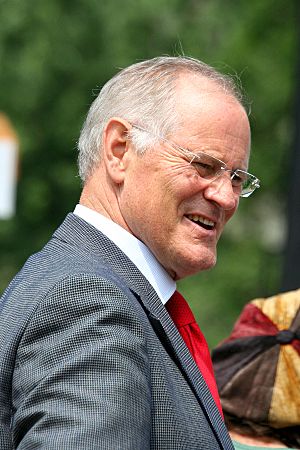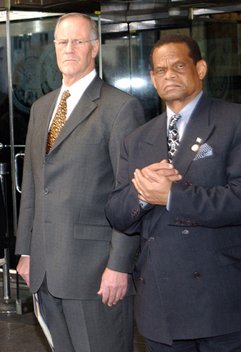Bill Graham (Canadian politician) facts for kids
Quick facts for kids
Bill Graham
|
|
|---|---|

Graham in 2007
|
|
| Leader of the Opposition | |
| In office February 7, 2006 – December 2, 2006 |
|
| Preceded by | Stephen Harper |
| Succeeded by | Stéphane Dion |
| Interim Leader of the Liberal Party | |
| In office March 18, 2006 – December 3, 2006 |
|
| Preceded by | Paul Martin |
| Succeeded by | Stéphane Dion |
| Minister of National Defence | |
| In office July 20, 2004 – February 6, 2006 |
|
| Prime Minister | Paul Martin |
| Preceded by | David Pratt |
| Succeeded by | Gordon O'Connor |
| Minister of Foreign Affairs | |
| In office January 15, 2002 – July 19, 2004 |
|
| Prime Minister |
|
| Preceded by | John Manley |
| Succeeded by | Pierre Pettigrew |
| Member of the Canadian Parliament for Toronto Centre (Toronto Centre—Rosedale; 1997–2004) |
|
| In office October 25, 1993 – July 2, 2007 |
|
| Preceded by | David MacDonald |
| Succeeded by | Bob Rae |
| Personal details | |
| Born |
William Carvel Graham
March 17, 1939 Montreal, Quebec, Canada |
| Died | August 7, 2022 (aged 83) |
| Political party | Liberal |
| Spouse |
Catherine Curry
(m. 1962) |
| Residences | Toronto, Ontario, Canada |
| Occupation |
|
| Military service | |
| Allegiance | |
| Branch/service | |
| Years of service | 1960–1970 |
| Rank | |
| Unit | University Naval Training Division |
| Alma mater |
|
| Scientific career | |
| Institutions | University of Toronto |
William Carvel Graham (March 17, 1939 – August 7, 2022) was a Canadian lawyer, professor, and politician. He held important roles in the Canadian government. Graham served as the Minister of Foreign Affairs and the Minister of National Defence. He was also the interim leader of the Liberal Party of Canada. After leaving politics, he became the chancellor of Trinity College, Toronto at the University of Toronto.
Contents
Early Life and Education
Bill Graham was born in Montreal, Quebec, on March 17, 1939. He was raised by his grandparents in Toronto, Ontario, for a few years. Later, he joined his mother and stepfather in Vancouver, British Columbia.
He attended Upper Canada College and then Trinity College, Toronto at the University of Toronto. He also studied law at the University of Toronto Faculty of Law. He was a top student there. Graham continued his studies at the University of Paris. While at university, he served in the Royal Canadian Naval Reserve. He became a Sub-Lieutenant in 1960.
In 1962, he married Catherine Curry. They had two children: a daughter named Katherine (born in 1964) and a son named Patrick (born in 1965).
Career Before Politics
After finishing law school, Graham went to Paris. He studied international law and improved his French. He also worked for a Toronto law firm there. When he returned to Toronto in 1968, he continued working as a lawyer. He focused on international trade law.
Graham also got involved in community work. He helped promote French and English languages in Canada. He was the president of Alliance Francaise de Toronto for many years.
University Professor
In 1981, Graham started teaching law at the University of Toronto Faculty of Law. He taught courses on international law and trade law. He also became the president of the University of Toronto Faculty Association. In this role, he made sure that donations to the university did not limit academic freedom. This means professors could still teach and research freely.
He also taught as a guest professor at McGill University and the Université de Montréal. In 1999, he created a special fund for international law studies at the law school.
Political Journey
Bill Graham tried to become a Member of Parliament (MP) twice before winning. He ran in the riding of Toronto Centre-Rosedale. He finally won in the 1993 federal election. He was re-elected four more times until 2006.
As an MP, he spent six years as the Chair of the House of Commons Standing Committee on Foreign Affairs and International Trade. This committee studies Canada's relationships with other countries. Under his leadership, the committee wrote reports on many global topics. These included nuclear weapons, the World Trade Organization (WTO), and Canada's ties with Europe. Graham also worked to connect parliaments from different countries. He believed in "parliamentary diplomacy."
He also supported important social issues in Canada. For example, he was an early supporter of legal recognition for same-sex couples. He was recognized for his work by the readers of 'Now' Magazine in Toronto.
Minister of Foreign Affairs
In January 2002, Prime Minister Jean Chrétien made Graham the Minister of Foreign Affairs. This was a very important job. His time in this role was shaped by global events after the 9/11 terrorist attacks.
One major issue was the 2003 invasion of Iraq. Canada, led by Chrétien and Graham, did not support military action without clear approval from the United Nations Security Council. Canada suggested more time for weapons inspections. However, the United States and its allies decided to invade without UN approval. Canada chose not to join this invasion.
Canada did support other parts of the global fight against terrorism. Canadian troops helped in Afghanistan to remove the Taliban government. In 2003, Canada took a leading role in the International Security Assistance Force (ISAF) in Afghanistan. This was a NATO mission to help bring stability.
There were some challenges in Canada-U.S. relations. For example, a Canadian citizen, Maher Arar, was sent to Syria by U.S. authorities. He was imprisoned and tortured there. Graham worked to get him released. Graham also tried to help Omar Khadr, a Canadian held at the U.S. Guantanamo Bay detention camp. Despite these differences, Graham and U.S. Secretary of State Colin Powell worked well together on many issues. They sent Canadian forces to Haiti to help after a political crisis.
Minister of National Defence
When Paul Martin became Prime Minister in 2003, he moved Graham to the role of Minister of National Defence. This meant Graham was in charge of Canada's military. Prime Minister Martin wanted to increase defence spending. Graham worked to rebuild the Canadian military after years of budget cuts.
One big decision was about Canada joining the U.S. Ballistic Missile Defence (BMD) program. Graham supported Canada's involvement. He worried that not joining would weaken Canada's role in North American defence. However, many Canadians opposed the program. In February 2005, Canada decided not to join.
In July 2005, Graham visited Hans Island in the Arctic. Both Canada and Denmark claimed this island. Denmark protested his visit. Later, the two countries began talks to settle the island's ownership.
A major success for Graham was getting more money for Canada's defence. He convinced the Prime Minister and Finance Minister to approve a $13-billion increase in defence spending. This was the largest increase in a long time. This money helped buy new equipment, like Hercules aircraft. The military's command structure was also updated to better respond to disasters or terrorist threats.
Graham and General Rick Hillier, the Chief of the Defence Staff, wanted to make the Canadian Forces (CF) more mobile. They wanted the CF to be able to help in "peacemaking" and humanitarian missions. This was a new approach. It focused on restoring order in unstable countries that might be used by terrorists. This new plan was part of a larger review of Canada's foreign policy.
Graham and Hillier decided to use Afghanistan as a test for this new plan. In 2005, Canada announced that its troops in Kabul would move to Kandahar province. Canada took on a big role in Southern Afghanistan. Graham supported a "whole of government" approach. This meant diplomats, military, police, and aid workers would work together. They would provide security and rebuild communities. During his time as Defence Minister, Canada's Disaster Assistance Response Team (DART) helped Sri Lanka after the 2005 tsunami.
Before the 2006 federal election, Graham helped create an agreement. This agreement was about how Afghan prisoners captured by Canadian forces would be treated by Afghan authorities. Later, there were concerns that some prisoners had been tortured. Graham explained that the agreement was made under difficult circumstances. He said it was hard to predict all problems at the time.
Interim Liberal Leader
After the Liberal Party lost the 2006 election, Bill Graham became the interim (temporary) Leader of the Liberal Party. He also served as the Leader of the Opposition. He held these roles until a new leader, Stéphane Dion, was chosen in December 2006. During his time as leader, the House of Commons discussed important topics. These included recognizing Quebec as a "nation" and extending Canada's mission in Afghanistan. Graham did not take sides in the race to choose a new leader. In 2007, he announced he would not run for re-election. He stepped down as an MP on July 2, 2007. This allowed Bob Rae to run for the seat.
After Politics
After leaving politics, Bill Graham stayed active in many organizations. In 2007, he became the Chancellor of Trinity College, Toronto. He was also involved with the Atlantic Council of Canada and the Canadian International Council. He was the Honorary Colonel of the Governor General's Horse Guards for many years. In 2010, he received an honorary degree from the Royal Military College of Canada. In 2018, he was made Honorary Colonel of Canadian Special Operations Forces Command.
Graham received many awards for his work. He was made a member of the Order of Canada in 2015. This is one of Canada's highest honors. He also received awards from the French government for his support of the French language and culture. In 2011, he helped create the Bill Graham Centre for Contemporary International History. This center studies current global events from a historical point of view.
Graham also helped with the Government of Canada's Defence Review. This review aimed to create a future plan for Canada's defence policy. In 2016, Graham published his autobiography, Call of the World: A Political Memoir.
Bill Graham passed away on August 7, 2022.
Honours and Awards
Bill Graham received many honours and awards for his service to Canada and his community.
- Order of Canada (OC)
- Queen Elizabeth II Golden Jubilee Medal (2002)
- Queen Elizabeth II Diamond Jubilee Medal (2012)
- Legion of Honour (Chevalier) from France
- Order of La Pléiade (Chevalier)
Education and Academic Roles
Bill Graham earned several degrees and held important positions in universities:
- Upper Canada College
- Trinity College, Toronto (Bachelor of Arts in Modern History, 1961)
- University of Toronto (Bachelor of Laws, 1964)
- University of Paris
He also held academic leadership roles:
- Trinity College, Toronto (Chancellor, 2007–)
- Massey College, Toronto (Senior Fellow)
- Green College, University of British Columbia (Honorary Life Fellow)
He received honorary degrees:
- Royal Military College of Canada (Doctor of Laws, 2010)
- University of Toronto (Doctor of Laws, 2018)
Other Appointments
- Queen's Privy Council for Canada (Member, 2002–)
- Queen's Counsel (QC)
Honorary Military Appointments
- 2007–2012: Honorary Lieutenant Colonel of the Governor General's Horse Guards
- 2012–2018: Honorary Colonel of the Governor General's Horse Guards
Images for kids
See also
 In Spanish: Bill Graham (político) para niños
In Spanish: Bill Graham (político) para niños
 | Roy Wilkins |
 | John Lewis |
 | Linda Carol Brown |


